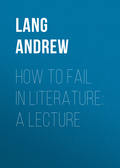
Lang Andrew
The True Story Book
The boat's head was brought round to the stream, for it was necessary to run her into it with the impulse of the back-water to shoot her forward, or she would have been drawn back, stern foremost, into the eddy, where the jaw of the water, over the point of the rock, would have swamped us in an instant. Donald knelt at the bows, and held fast by a light painter till I cried 'Ready!' when the little shallop sprung from the rope, tilted away like a sea-bird, and glided towards the roaring torrent. I looked over my shoulder; Donald was gripping the bows, his teeth set fast, but a gleam of light was in his eye as we plunged headlong into the bursting stream. A blow like the stroke of a mighty wooden hammer lifted the boat into the surf; there was a crack as if her bows were stove in, and she shot shivering through the pool, filled with water to our knees, and sending the spray over us like a sheet. The rocks and trees seemed to fly away; the roaring water spouted and boiled, as it lifted up the boat, which spun round like a leaf, with her starboard gunwale lipping with the waves; but a few seconds swept us through the pool, and we were flying into the mad tumbling thunder of the rapid below. I kept the larboard bow to the stream, and pulled with all my might; but I thought she did not move, the eddy of the great mid-stream seemed to fix her in the ridge of the torrent, and take her along with it; the oars bent like willows to the strain, a boiling gush from below lifted her bows, and threw her gunwale under the froth. I thought we were gone, but I redoubled the last desperate strokes, and we shot out of the foaming ridge towards the opposite bank, rolling, and leaping, and plunging into the throat of the rapid. Donald sat like a tiger ready for the spring, and as we neared the shore, bounded on the grass with the chain. This checked the speed of the boat; I unshipped the oars, and sprung out just as the coble came crash alongside the bank, then swirling round, her head flew out to the stream, dragging Donald along the grass after her. I jumped into the water, and caught hold of the bow; for two minutes the struggle was doubtful and she continued to drag us along: at last Donald reached the stump of a tree, and, running round it, made a turn of the chain and brought her up.
We sat down, and wiped our faces, and looked at each other in silence. The incredibly short space of time which had elapsed since we stood on the 'other side,' with the mysterious future before us, and now to be sitting on 'this,' and call it the past, was like a dream. The tumult, the flying shoot, the concussion at parting and arriving, seemed like an explosion, as if we had been blown up and thrown over. 'I don't think that boat will ever go back again, Thighearna,' said Donald. 'Why not?' 'Did you not feel her twist, and hear her split, when we came into the burst of the stream?' replied Donald. 'I don't know,' said I; 'I felt and heard a great many things, but there was no time to think what they were.' 'Oh, it was not thinking that I was,' answered Donald; 'but the water came squirting up in my face through her ribs, and I held on by both bows, expecting at every stroke to see them open and let me through.' We got up and examined the boat's bottom; there was a yawning rent from the stem to the centre, and part of the torn planks lapped one over the other by the twist, the bows being only held together by the iron band which bound the gunwale.
THE STORY OF GRACE DARLING
A CAREFUL reader of the 'Times' on the morning of Tuesday, September 11, 1838, might have found, if he cared to look, a certain paragraph in an obscure corner headed 'The Wreck of the "Forfarshire."' It is printed in the small type of that period; the story is four days old, for in those days news was not flashed from one end of the country to the other; and, moreover, the story is very incomplete.
On the evening of Wednesday, September 5, the steamship 'Forfarshire' left Hull for Dundee, carrying a cargo of iron, and having some forty passengers on board. The ship was only eight years old; the master, John Humble, was an experienced seaman; and the crew, including firemen and engineers, was complete. But even before the vessel left the dock one passenger at least had felt uneasily that something was wrong – that there was an unusual commotion among officials and sailors. Still, no alarm was given, and at dusk the vessel steamed prosperously down the Humber.
The next day (Thursday, the 6th) the weather changed, the wind blowing N.N.W., and increasing towards midnight to a perfect gale. On the morning of Friday, the 7th, a sloop from Montrose, making for South Shields, saw a small boat labouring hard in the trough of the sea. The Montrose vessel bore down on it, and in spite of the state of the weather managed to get the boat's crew on board.
They were nine men in all, the sole survivors, as they believed themselves to be, of the crew and passengers of the 'Forfarshire,' which was then lying a total wreck on Longstone, one of the outermost of the Farne Islands.
It was a wretched story they had to tell of lives thrown away through carelessness and negligence, unredeemed, as far as their story went, by any heroism or unselfish courage.
While still in the Humber, and not twenty miles from Hull, it was found that one of the boilers leaked, but the captain refused to put about. The pumps were set to work to fill the boiler, and the vessel kept on her way, though slowly, not passing between the Farne Islands and the mainland till Thursday evening. It was eight o'clock when they entered Berwick Bay; the wind freshened and was soon blowing hard from the N.N.W. The motion of the vessel increased the leakage, and it was now found that there were holes in all the three boilers. Two men were set to work the pumps, one or two of the passengers also assisting, but as fast as the water was pumped into the boilers it poured out again. The bilge was so full of steam and boiling water that the firemen could not get to the fires. Still the steamer struggled on, labouring heavily, for the sea was running very high. At midnight they were off St. Abbs Head, when the engineers reported that the case was hopeless; the engines had entirely ceased to work. The ship rolled helplessly in the waves, and the rocky coast was at no great distance. They ran up the sails fore and aft to try and keep her off the rocks, and put her round so that she might run before the wind, and as the tide was setting southward she drifted fast with wind and tide. Torrents of rain were falling, and in spite of the wind there was a thick fog. Some of the passengers were below, others were on deck with crew and captain, knowing well their danger.
About three the noise of breakers was distinctly heard a little way ahead, and at the same time a light was seen away to the left, glimmering faintly through the darkness. It came home to the anxious crew with sickening certainty that they were being driven on the Farne Islands. [Now these islands form a group of desolate whinstone rocks lying off the Northumbrian coast. They are twenty in number, some only uncovered at low tide, and all offering a rugged iron wall to any ill-fated boat that may be driven upon them. Even in calm weather and by daylight seamen are glad to give them a wide berth.]
The master of the 'Forfarshire' in this desperate strait attempted to make for the channel which runs between the Islands and the mainland. It was at best a forlorn chance; it was hopeless here; the vessel refused to answer her helm! On she drove in the darkness, nearer and nearer came the sound of the breakers; the fear and agitation on board the boat grew frantic. Women wailed and shrieked; the captain's wife clung to him, weeping; the crew lost all instinct of discipline, and thought of nothing but saving their skins.
Between three and four the shock came – a hideous grinding noise, a strain and shiver of the whole ship, and she struck violently against a great rock. In the awful moment which followed five of the crew succeeded in lowering the larboard quarter-boat and pushed off in her. The mate swung himself over the side, and also reached her; and a passenger rushing at this moment up from the cabin and seeing the boat already three yards from the ship, cleared the space with a bound and landed safely in her, though nearly upsetting her by his weight. She righted, and the crew pulled off with the desperate energy of men rowing for their lives. The sight of agonised faces, the shrieks of the drowning were lost in the darkness and in the howling winds, and the boat with the seven men on board was swept along by the rapidly-flowing tide.
Such was the story the exhausted boat's crew told next morning to their rescuers on board the Montrose sloop. And the rest of the ship's company – what of them? Had they all gone down by the island crag with never a hand stretched out to help them?
Hardly had the boat escaped from the stranded vessel when a great wave struck her on the quarter, lifted her up bodily, and dashed her back on the rock. She struck midships on the sharp edge and broke at once into two pieces. The after part was washed clean away with about twenty passengers clinging to it, the captain and his wife being among them. A group of people, about nine in number, were huddled together near the bow; they, with the whole fore part of the ship, were lifted right on to the rock. In the fore cabin was a poor woman, Mrs. Dawson, with a child on each arm. When the vessel was stranded on the rock the waves rushed into the exposed cabin, but she managed to keep her position, cowering in a corner. First one and then the other child died from cold and exhaustion, and falling from the fainting mother were swept from her sight by the waves, but the poor soul herself survived all the horrors of the night.
It was now four o'clock; the storm was raging with unabated violence, and it was still two hours to daybreak. About a mile from Longstone, the island on which the vessel struck, lies Brownsman, the outermost of the Farne Islands, on which stands the lighthouse. At this time the keeper of the lighthouse was a man of the name of William Darling. He was an elderly, almost an old man, and the only other inmates of the lighthouse were his wife and daughter Grace, a girl of twenty-two. On this Friday night she was awake, and through the raging of the storm heard shrieks more persistent and despairing than those of the wildest sea-birds. In great trouble she rose and awakened her father. The cries continued, but in the darkness they could do nothing. Even after day broke it was difficult to make out distant objects, for a mist was still hanging over the sea. At length, with a glass they could discern the wreck on Longstone, and figures moving about on it. Between the two islands lay a mile of yeasty sea, and the tide was running hard between them. The only boat on the lighthouse was a clumsily built jolly-boat, heavy enough to tax the strength of two strong men in ordinary weather, and here there was but an old man and a young girl to face a raging sea and a tide running dead against them. Darling hesitated to undertake anything so dangerous, but his daughter would hear of no delay. On the other side of that rough mile of sea men were perishing, and she could not stay where she was and see them die.
So off they set in the heavy coble, the old man with one oar, the girl with the other, rowing with straining breath and beating hearts. Any moment they might be whelmed in the sea or dashed against the rocks. Even if they got the crew off it would be doubtful if they could row them to the lighthouse; the tide was about to turn, and would be against them on their homeward journey; death seemed to face them on every side.
When close to the rock there was imminent danger of their being dashed to pieces against it. Steadying the boat an instant, Darling managed to jump on to the rock, while Grace rapidly rowed out a little and kept the boat from going on the rocks by rowing continually. It is difficult to imagine how the nine shipwrecked people, exhausted and wearied as they were, were got into the boat in such a sea, especially as the poor woman, Mrs. Dawson, was in an almost fainting condition; but finally got on board they all were. Fortunately, one or two of the rescued crew were able to assist in the heavy task of rowing the boat back to Brownsman.
The storm continued to rage for several days after, and the whole party had to remain in the lighthouse. Moreover, a boatload which had come to their rescue from North Shields was also storm-stayed, twenty guests in all, so that the housewifely powers of Grace and her mother were taxed to the utmost.
It is told of this admirable girl that she was the tenderest and gentlest of nurses and hostesses, as she was certainly one of the most singularly courageous of women.
She could never be brought to look upon her exploit as in any way remarkable, and when by-and-by honours and distinctions were showered upon her, and people came from long distances to see her, she kept through it all the dignity of perfect simplicity and modesty.
Close to Bamborough, on a windy hill, lie a little grey church and a quiet churchyard. At all seasons high winds from the North Sea blow over the graves and fret and eat away the soft grey sandstone of which the plain headstones are made. So great is the wear and tear of these winds that comparatively recent monuments look like those which have stood for centuries. On one of these stones lies a recumbent figure, with what looks not unlike a lance clasped in the hand and laid across the breast. Involuntarily one thinks of the stone Crusaders, who lie in their armour, clasping their half-drawn swords, awaiting the Resurrection morning. It is the monument of Grace Darling, who here lies at rest with her oar still clasped in her strong right hand.
THE 'SHANNON' AND THE 'CHESAPEAKE'
AMONG the captains of British 38-gun frigates who ardently longed for a meeting with one of the American 44-guns, in our war with the United States, was Captain Philip Bowesbere Broke, of the 'Shannon.' The desire sprang from no wish to display his own valour, only to show the world what wonderful deeds could be done when the ship and crew were in all respects fitted for battle. He had put his frigate in fighting order, taught his men the art of attack and defence, and out of a crew not very well disposed and got together in a rather haphazard manner, had made a company as pleasant to command as it was dangerous to meet.
With this desire, in March 1813 Captain Broke sailed from Halifax on a cruise in Boston Bay. But to his disappointment two American frigates, the weather being foggy, left the harbour without his having a chance to encounter them. Two remained, however, and one of these, the 'Chesapeake,' commanded by Captain James Lawrence, was nearly ready for sea. When her preparations were complete, Captain Broke addressed to her commanding officer a letter of challenge, having previously sent a verbal message, which had met with no reply.
'As the "Chesapeake" appears now ready for sea,' began this letter, 'I request you will do me the favour to meet the "Shannon" with her, ship to ship, to try the fortune of our respective flags.'
He then gave an account of the 'Shannon's' forces, which were somewhat inferior to the 'Chesapeake's.' The 'Chesapeake' had 376 men, the 'Shannon' 306 men and 24 boys, and the American vessel also had the advantage in guns.
'I entreat you, sir,' Captain Broke concluded, 'not to imagine that I am urged by mere personal vanity to the wish of meeting the "Chesapeake," or that I depend only upon your personal ambition for your acceding to this invitation. We have both nobler motives… Favour me with a speedy reply. We are short of provisions and water, and cannot stay long here.'
This letter he entrusted to Captain Plocum, a discharged prisoner; but it so happened that before his boat reached the shore, the American frigate left it – Captain Lawrence having received permission from Commodore Bairbridge to sail and attack the 'Shannon' in response to Captain Broke's verbal challenge.
Some manœuvring between the two ships took place; but at last, in the evening of June 1, 1813, the 'Chesapeake,' with three ensigns flying, steered straight for the 'Shannon's' starboard quarter. Besides the ensigns, she had flying at the fore a large white flag, inscribed with the words: 'Sailors' Rights and Free Trade,' with the idea, perhaps, that this favourite American motto would damp the energy of the 'Shannon's' men. The 'Shannon' had a Union Jack at the fore, an old rusty blue ensign at the mizzen peak, and two other flags rolled up, ready to be spread if either of these should be shot away. She stood much in need of paint, and her outward appearance hardly inspired much belief in the order and discipline that reigned within.
At twenty minutes to six Captain Lawrence came within fifty yards of the 'Shannon's' starboard quarter, and gave three cheers. Ten minutes after the 'Shannon' fired her first gun, then a second. Then the 'Chesapeake' returned fire, and the remaining guns on the broadside of each ship went off as fast as they could be discharged.
Four minutes before six the 'Chesapeake's' helm, probably from the death of the men stationed at it, being for the moment unattended to, the ship lay with her stem and quarter exposed to her opponent's broadside, which did terrible execution. At six o'clock, the 'Chesapeake' and 'Shannon' being in close contact, the 'Chesapeake,' endeavouring to make a little ahead, was stopped by becoming entangled with the anchor of the 'Shannon.' Captain Broke now ran forward, and, seeing the 'Chesapeake's' men deserting the quarter-deck guns, he ordered the two ships to be lashed together, the great guns to cease firing, and Lieutenant Watt to bring up the quarter-deck men, who were to act as boarders. This was done instantly, and at two minutes past six Captain Broke leaped aboard the 'Chesapeake,' followed by twenty men, and reached her quarter-deck.
Here not an officer or man was to be seen. Upon the 'Chesapeake's' gangways, twenty-five or thirty Americans made a slight resistance, but were quickly driven towards the forecastle. Several fled over the bows, some, it is believed, plunged into the sea, the rest laid down their arms and submitted.
Lieutenant Watt, with others, followed quickly. Hardly had he stepped upon the taffrail of the 'Chesapeake' when he was shot through the foot by a musket ball; but, rising in spite of it, he ordered one of the 'Shannon's' 9-pounders to be directed at the 'Chesapeake's' mizzen top, whence the shot had come. The second division of the Marines now rushed forward, and while one party kept down the Americans who were ascending the main hatchway, another party answered a destructive fire which still continued from the main and mizzen tops. The 'Chesapeake's' main top was presently stormed by midshipman William Smith. This gallant young man deliberately passed along the 'Shannon's' foreyard, which was braced up to the 'Chesapeake's' mainyard, and thence into her top. All further annoyance from the 'Chesapeake's' mizzen top was put a stop to by another of the 'Shannon's' midshipmen, who fired at the Americans from the yardarm as fast as his men could load the muskets and hand them to him.
After the Americans upon the forecastle had submitted, Captain Broke ordered one of his men to stand sentry over them, and sent most of the others aft, where the conflict was still going on. He was in the act of giving them orders when the sentry called out lustily to him. On turning, the captain found himself opposed by three of the Americans, who, seeing they were superior to the British then near them, had armed themselves afresh. Captain Broke parried the middle fellow's pike, and wounded him in the face, but instantly received from the man on the pikeman's right a blow with the butt-end of a musket, which bared his skull and nearly stunned him. Determined to finish the British commander, the third man cut him down with his broadsword, but at that very instant was himself cut down by Mindham, one of the 'Shannon's' seamen. Can it be wondered if all concerned in this breach of faith fell victims to the indignation of the 'Shannon's' men? It was as much as Captain Broke could do to save from their fury a young midshipman, who, having slid down a rope from the 'Chesapeake's' foretop, begged his protection.
While in the act of tying a handkerchief round his commander's head, Mindham, pointing aft, called out:
'There, sir – there goes up the old ensign over the Yankee colours!'
Captain Broke saw it hoisting (with what feelings may be imagined), and was instantly led to the 'Chesapeake's' quarter-deck, where he sat down.
That act of changing the 'Chesapeake's' colours proved fatal to a gallant British officer and four or five fine fellows of the 'Shannon's' crew. We left Lieutenant Watt just as, having raised himself on his feet after his wound, he was hailing the 'Shannon' to fire at the 'Chesapeake's' mizzen top. He then called for an English ensign, and hauling down the American flag, bent, owing to the ropes being tangled, the English flag below instead of above it. Observing the American stripes going up first, the 'Shannon's' people reopened their fire, and, directing their guns with their accustomed precision at the lower part of the 'Chesapeake's' mizzen mast, killed Lieutenant Watt and four or five of their comrades. Before the flags had got halfway to the mizzen peak, they were pulled down and hoisted properly, and the men of the 'Shannon' ceased their fire.
An unexpected fire of musketry, opened by the Americans who had fled to the hold, killed a fine young marine, William Young. On this, Lieutenant Falkiner ordered three or four muskets that were ready to be fired down the hold, and Captain Broke, from the quarter-deck, told the lieutenant to summon. The Americans replied, 'We surrender'; and all hostilities ceased. Almost immediately after Captain Broke's senses failed him from loss of blood, and he was conveyed on board his own ship.
Between the discharge of the first gun and the time of Captain Broke's boarding only eleven minutes had passed, and in four minutes more the 'Chesapeake' was completely his. As a rule, however, this good fortune did not attend our arms in the conflict with the American marine.






